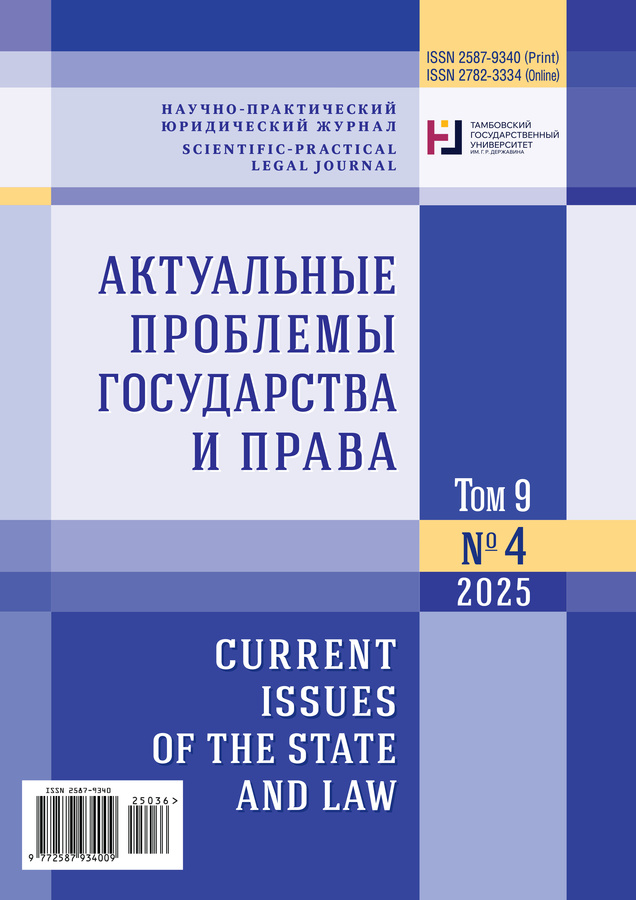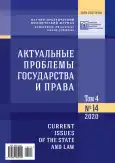АКТУАЛЬНЫЕ ВОПРОСЫ ВОЗБУЖДЕНИЯ УГОЛОВНЫХ ДЕЛ О ВЗЯТОЧНИЧЕСТВЕ
- Авторы: Анапольская А.И.1
-
Учреждения:
- Российская академия народного хозяйства и государственной службы при Президенте РФ
- Выпуск: Том 4, № 14 (2020)
- Страницы: 232-240
- Раздел: Процессуальное право
- URL: https://journal-vniispk.ru/2587-9340/article/view/304128
- ID: 304128
Цитировать
Аннотация
Рассмотрены поводы и основания для возбуждения уголовных дел о взяточничестве. Отмечено, что поступившие в любой форме заявления и сообщения подлежат проверке, методы которой имеют негласный характер и избираются в зависимости от вида отрасли и деятельности должностного лица, в отношении которого получены данные о взяточничестве. Уделено внимание особенностям проведения тактической операции «задержание с поличным», последующего освидетельствования взяткополучателя на предмет наличия на его теле и одежде специального химического вещества, свидетельствующего об его прикосновении к денежным средствам. При этом отмечено, что на практике во избежание ситуаций, когда вещество не оставило след или лицо не прикасалось к самим денежным купюрам в целях идентификации последних, рекомендуется переписать их номера и серии. Особое внимание в исследовании уделено вопросам привлечения к процессу рассмотрения первоначальной информации специалистов, а также возможностям использования на первоначальном этапе расследования таких преступлений технико-криминалистических средств. Отмечено, что дискуссионным при проведении задержания с поличным является вопрос присутствия следователя и осуществление им процессуального руководства тактической операцией. Сделан вывод о недопустимости участия следователя в такой операции, поскольку проведение проверки в порядке статей 144–145 УПК РФ возможно только после поступления и регистрации в следственном органе сообщения о преступлении.
Об авторах
Алина Игоревна Анапольская
Российская академия народного хозяйства и государственной службы при Президенте РФ
Автор, ответственный за переписку.
Email: alinaanapolskaya@mail.ru
ORCID iD: 0000-0001-9022-1752
кандидат юридических наук, доцент, заведующий кафедрой правовых дисциплин
Россия, 119571, Российская Федерация, г. Москва, пр-т Вернадского, 82Список литературы
- Машков С.А. Раскрытие и расследование фактов взяточничества с использованием результатов оперативно-розыскной деятельности: дис. … канд. юрид. наук. Иркутск, 2004. 218 с.
- Косякова Н. Дача взятки – преступление или крайняя необходимость? // Российская юстиция. 1999. № 5. C. 50-57.
- Филатова Т.В., Волынский А.Ф. Проблемы расследования взяточничества как проявления коррупции на первоначальном этапе // Вестник Московского университета МВД России. 2008. № 10. С. 115-118.
- Никитина Е.В. Поводы и основания для возбуждения уголовного дела при расследовании взяточничества в сфере образования // Современные научные исследования: теория, методология, практика. 2010. № 5. С. 288-292.
- Попова О.А. Некоторые проблемы, возникающие при решении вопроса о возбуждении уголовных дел о взяточничестве // Молодежь Сибири – науки России: материалы Междунар. науч.-практ. конф. Красноярск, 2014. С. 354-359.
- Новик В.В. Взяточничество: криминалистические проблемы доказывания // Расследование и судебное преследование коррупции: материалы российско-амери-канского семинара. М., 2002. С. 128-129.
- Ильин Н.Н. Использование видеозаписи в деятельности правоохранительных органов при раскрытии, пресечении и предупреждении преступлений // Расследование преступлений: проблемы и пути их решения. 2016. № 3 (13). С. 139-144.
- Иванова Т.И., Хлус А.М. Особенности подготовки и проведения тактической операции по задержанию с поличным при получении взятки // Актуальные проблемы права и управления глазами молодежи: материалы 3 Междунар. науч. конф. / гл. ред. И.Б. Богородицкий, отв. ред. Ю.В. Киселевич. Тула: Изд-во ИЗУ ВПА, 2016. С. 119-124.
- Долинин В.Н. Особенности тактической операции «Задержание с поличным» при расследовании взяточничества // Российский юридический журнал. 2015. № 3 (102). С. 174-178.
- Гончаров Д.Ю., Карагодин В.Н. Первоначальный этап расследования взяточничества. Екатеринбург, 2009. 220 с.
- Правовые и криминалистические аспекты расследования некоторых видов коррупционных преступлений / В.Н. Карагодин, Е.Г. Быкова, Н.Б. Вахмянина и др. (авт.-сост.); под общ. ред. В.Н. Карагодина. М.: Проспект, 2016. 400 с.
Дополнительные файлы









